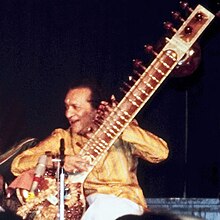Students may now sign up for our 2018 Halloween Parties on the Recitals page of our website.
Have a spooky day!
Students may now sign up for our 2018 Halloween Parties on the Recitals page of our website.
Have a spooky day!
To continue Classical Music Month, here’s another awesome composer!
 Meet Ravi Shankar – an Indian composer of Hindustani classical music. Shankar is known for his use of the sitar in his compositions, and using different rhythms to create a style different from other composers. Not only was Shankar a composer, but he was a gifted sitar player as well. He once collaborated with George Harrison of The Beatles, which inspired Harrison to record part of the song Norwegian Wood on sitar! Shankar passed away in 2012 but his legacy lives on in Indian and Western music alike.
Meet Ravi Shankar – an Indian composer of Hindustani classical music. Shankar is known for his use of the sitar in his compositions, and using different rhythms to create a style different from other composers. Not only was Shankar a composer, but he was a gifted sitar player as well. He once collaborated with George Harrison of The Beatles, which inspired Harrison to record part of the song Norwegian Wood on sitar! Shankar passed away in 2012 but his legacy lives on in Indian and Western music alike.
 Sofia Gubaidulina was born in the Soviet Union, and she loved music even from a young age. She associated music with spirituality and some of her music is considered abstract. She used the musical technique of improvisation (meaning making up music on the spot) and sometimes she uses unconventional combinations of instruments, like a saxophone quartet! Gubaidulina is renowed across the world, and last year she received an Honorary Doctor of Music Degree from the New England Conservatory!
Sofia Gubaidulina was born in the Soviet Union, and she loved music even from a young age. She associated music with spirituality and some of her music is considered abstract. She used the musical technique of improvisation (meaning making up music on the spot) and sometimes she uses unconventional combinations of instruments, like a saxophone quartet! Gubaidulina is renowed across the world, and last year she received an Honorary Doctor of Music Degree from the New England Conservatory!
We tend to get in the habit of listening to the same music over and over again, and only listening to new music when an artist we already like puts out an album. A study from Northwestern University showed that listening to different styles of music makes you use more parts of your brain, including the emotional part of your brain!
In our day and age, you can find playlists online of music from different countries or genres. Try listening to songs in a language you don’t speak. Can you tell what the song is about by how the music sounds?
Next time you’re in the car, put on some music that you or your kids wouldn’t normally listen to. Talk about it! How does unfamiliar music make you feel? You might discover your new favorite song!
Katie Ball, Gahanna Lab Lead
 What is music theory? Why do I need it? Music theory is the reasoning behind how music works. It starts with the fundamentals, and as you work through concepts you form a deeper understanding of what exactly you are hearing in the music you listen to.
What is music theory? Why do I need it? Music theory is the reasoning behind how music works. It starts with the fundamentals, and as you work through concepts you form a deeper understanding of what exactly you are hearing in the music you listen to.
If someone asked you to describe a painting, but you had never been taught the names of any colors, would you be able to describe it?
Music theory starts with the notes on the staff, basic rhythms, and articulation marks. Notes are like the letters in a sentence, with rhythm being the number of syllables in the words and the articulation marks representing punctuation. These are the basic elements everyone needs to be able to read music.
Once you understand the notes and how to play or sing them, you will begin to see patterns in the music. The next level of music theory helps you identify those patterns, like repetition in the music or different chord progressions. While music is an art and can exist in many different forms, there are some common patterns that exist in many songs. Understanding the pattern in one may help you understand another song as well.
Music theory teaches you why music has different effects on us when we hear it. What is it about a song that makes it sound happy? Or sad? Or angry?
Perhaps most importantly, music theory teaches you how to perform well. If you do not understand articulation marks or the history of a piece, you may be ignoring things that contribute to how the composer wanted the music to sound. Once you understand all that is written on the page, you can use your own knowledge of musical elements to develop your own style.
Without music theory, musical traditions would never have been passed on. There is no way we would know what a piece written before the advent of recording devices was meant to sound like.
Music theory is an essential part of learning music and being a well-rounded musician.